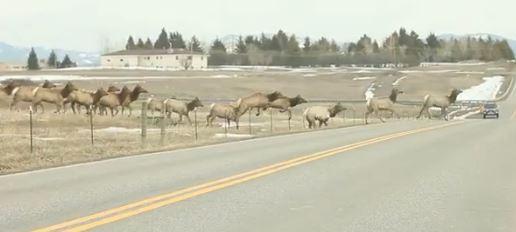A fairly large number of people believe that the Yellowstone volcano--also known as the supervolcano--might blow soon, signaled, they say, by animals appearing to flee the park.
First it was bison. Now some bloggers have been posting analysis on a video that they say shows a herd of elk sprinting out of the park, including over a fence.
“A massive herd of elk, sprinting and jumping the gate away from Yellowstone. This is huge,” said one blogger.
“Oh they’re going to their summer locations, we’re told. But wouldn’t they stay within the gate. They’re restricted to that gate, but still the herds run away. This is another huge sign of mass animal movements. Look at the size of the herd.”
The video of bison seemingly leaving the park went viral online and sparked suspicion over what was happening, although a man who goes by “Yellowstone Leo” claims to be the source of the video and says that the video actually shows the bison running deeper into the park.
Park spokesman Dan Hottle confirmed to the Jackson Hole Daily that they are actually running toward the park’s interior and the volcano.
Other scientists and agencies chimed in, such as Ilya Bindeman, an associate professor of geological sciences at the University of Oregon.
“Yellowstone is one of the biggest supervolcanos in the world,” he said in an analysis released by the university. “Sometimes it erupts quietly with lava flow, but once or twice every million years, it erupts very violently, forming large calderas,” which are very large craters measuring tens of kilometers in diameter.
If a huge eruption happened again, similar to three big ones over the last two million years, he says that the eruption would obliterate the surroundings within a radius of over 100 miles and cover the rest of the United States and Canada with multiple inches of ash. A volcanic event of such magnitude “hasn’t happened in modern civilization,” he said.

A diagram shows the potential range of destruction if the supervolcano was to explode. (University of Wisconsin Eau Claire)
However, Bindeman said he doesn’t think that this kind of eruption will happen anytime soon. He says it won’t happen for at least another million years.
“Our research of the pattern of such volcanism in two older, ‘complete’ caldera clusters in the wake of Yellowstone allows a prognosis that Yellowstone is on a dying cycle, rather than on a ramping up cycle,” he said.
Bloggers, many of whom tend to lean toward conspiracy theories, don’t believe the analysis.
“First it was bison running from Yellowstone, now its elk, and soon probably people. We see the signs. The writing is on the wall,” said one of the bloggers on 2127news.net.
“This is such a big situation, that not only did the herd of Bison running away make it to mainstream news, but around that time the American based news agencies came out and said that Yellowstone has gone extinct. Just as they always tell us, nothing to worry about. Move a long sheeple nothing to see here. Wake up! When they have to come out and cover up a simple video of Bison running you know something is up.”





